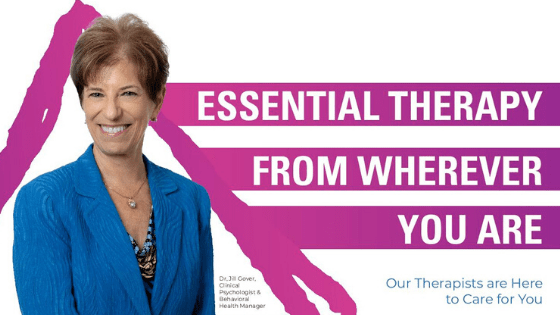
Good mental health also vital in coronavirus pandemic. A therapist can help.
COVID-19 has triggered fear and grief for many as we grapple with multiple losses. The fear of getting sick, losing one’s job, paying the bills, not being able to protect or care for elderly parents, etc., is compounded by the loss of routine, familiarity, consistency, and confidence. Uncertainty and the disruption of daily norms only increases grief and anxiety.
Now, more than usual, most of us could benefit from the expertise provided in therapy. People need support during this very challenging time, and mental health professionals are offering the tools necessary to help people cope.
The good news is that it's easier to access therapy now, because psychologists are using Virtual Visits and teleconferences to hold therapy sessions with their clients. Waiting lists are actually dwindling, and clients are getting help.
During this unprecedented time, therapy can help us distinguish the rational from the irrational. We may not even be consciously aware of own negative thoughts and how they make our situations worse. Therapists can help us identify the erroneous negative self-talk and faulty thinking that causes so much unnecessary emotional distress.
We are able to increase awareness of this negative self-talk that causes stress, and develop a new, more accurate and positive perspective. Therapy provides a chance for people to think deeply about their emotional well-being, and prioritize their mental health. Collaboratively with the support of a therapist, we are able to face our fears and develop action plans that will move us through the paralysis of fear to empowerment.
More than anything, psychotherapy is a reflective process that helps us better understand our experience so we can shape positive outcomes. Right now, we all need the opportunity to reflect on how COVID-19 has impacted us. It is a global, collective trauma the world has never seen in this century. It’s easy to become overwhelmed by the enormity of what we’re facing, and to slide into self-destructive behaviors.
In therapy we learn how to engage positive coping skills instead of relying on destructive, negative strategies, such as overeating, or substance use. Therapists can assist us develop solutions to reduce stress. In the safety of a therapeutic alliance, we access internal and external resources and as a result, avoid negative consequences.
Would you like to talk to a therapist in person or virtually? Desert AIDS Project offers essential therapy from wherever you are. Our therapists are here to care for you. Call (760) 992-0450 to find out more.








